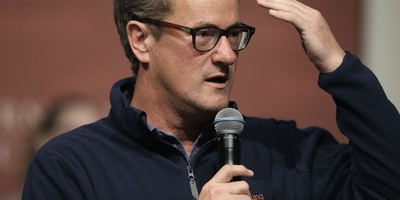Rubio's response, suggesting that Bush had been "told" to attack him, seemed like a bull's-eye. Jeb Bush is an honorable man, a man raised to behave like a gentleman; but he was feeling desperate at Wednesday's debate, and tried to play against type. It failed utterly. Rubio was ready, and parried Bush's thrust by highlighting -- for Bush and the audience -- how very unbecoming the attack was. He made Bush look small, and you could almost tell that Bush himself felt diminished for doing it. This was not the "joyful" race he had envisioned.
Is it really so shocking that Republican primary voters have turned their faces away from Jeb Bush? Though he was an outstanding governor of Florida, his election would represent something unprecedented in American politics -- a third president from one family. It bespeaks a wholesome anti-dynastic spirit in the electorate to say, "No. Two is the limit." Those were certainly my sentiments. Nor did his donor base guarantee anything. Who was the best-financed Republican candidate in 1980? Not Reagan. Not even George H.W. Bush. It was John Connolly. He got exactly one delegate.
On the other hand, since we're predicting his political demise, it's worth saying for the record that the anti-Bush vitriol among some on the right has been needlessly hysterical. There is nothing hateful about Jeb Bush or the Bush family. If they have a sense of entitlement, well, there are far worse things -- like, oh, the flagrant corruption we find in the likely Democratic nominee.
Recommended
Many on the right are completely convinced that, cycle after cycle, the "Republican establishment" foists "moderate" nominees on an unwilling conservative electorate. This is myth. Henry Olsen, my colleague at the Ethics and Public Policy Center, tracks election results with meticulous attention and observes that the reason moderates (Olsen actually calls them the "somewhat conservatives") get nominated is this: They get more votes. Though I wish the party were more conservative, and God knows I wish the country were more conservative, the voters are in charge.
In addition to Marco Rubio, Chris Christie and Ted Cruz also had very good nights at the third debate. Carly Fiorina was strong and sensible, too.
I think all of the Republican debates should be hosted by CNBC from now on. The network demonstrated a number of traits people loathe about the press -- and the candidates, most of them anyway, came out smelling like roses.
In the first place, by declining to use a stopwatch and a buzzer, CNBC (like CNN before it) guaranteed that the moderators would have to stomp on the candidates' sentences in a bullying fashion. This provided an opening for Chris Christie to quip: "That's rude even by New Jersey standards." By providing so few rules and leaving so much to "moderator discretion," CNBC invited the disorganized melee that sometimes broke out. This is an object lesson in letting liberals run things.
Second, by proffering "gotcha" questions, failing to provide sources ("Where did I read that?" asked Becky Quick at one point) and arguing with the candidates, the immoderate moderators revealed their bias.
Third, by posing questions about such trivia as missed votes, who said what about whom (and please repeat it here so we can have a food fight and higher ratings) and fantasy football betting, the questioners demonstrated that they are not up to the task of discussing the great challenges that face our nation.
The candidates, however, are. They sailed over the heads of the petty and niggling questions and managed to debate several serious points. 1) How to reform entitlements? 2) Is a flat tax feasible? 3) How can we generate economic growth? 4) What is the proper role of the federal government?
Well, not all of the candidates. The one candidate on the stage Wednesday night who had almost nothing of substance to say was the frontrunner. History suggests that the voters will not choose him when the time comes. But here's a question for the conspiracy theorists: If the Republican "establishment" always picks moderates, wouldn't that be Trump?

























Join the conversation as a VIP Member